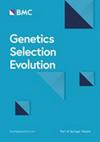Investigating the impact of paternal age, paternal heat stress, and estimation of non-genetic paternal variance on dairy cow phenotype
IF 3.1
1区 农林科学
Q1 AGRICULTURE, DAIRY & ANIMAL SCIENCE
引用次数: 0
Abstract
Linear models that are commonly used to predict breeding values in livestock species consider paternal influence solely as a genetic effect. However, emerging evidence in several species suggests the potential effect of non-genetic semen-mediated paternal effects on offspring phenotype. This study contributes to such research by analyzing the extent of non-genetic paternal effects on the performance of Holstein, Montbéliarde, and Normande dairy cows. Insemination data, including semen Batch Identifier (BI, a combination of bull identification and collection date), was associated with various traits measured in cows born from the insemination. These traits encompassed stature, milk production (milk, fat, and protein yields), udder health (somatic cell score and clinical mastitis), and female fertility (conception rates of heifers and cows). We estimated (1) the effects of age at collection and heat stress during spermatogenesis, and (2) the variance components associated with BI or Weekly aggregated BI (WBI). Overall, the non-genetic paternal effect estimates were small and of limited biological importance. However, while heat stress during spermatogenesis did not show significant associations with any of the traits studied in daughters, we observed significant effects of bull age at semen collection on the udder health of daughters. Indeed, cows born from bulls collected after 1500 days of age had higher somatic cell scores compared to those born from bulls collected at a younger age (less than 400 days old) in both Holstein and Normande breeds (+ 3% and + 5% of the phenotypic mean, respectively). In addition, across all breeds and traits analyzed, the estimates of non-genetic paternal variance were consistently low, representing on average 0.13% and 0.09% of the phenotypic variance for BI and WBI, respectively (ranging from 0 to 0.7%). These estimates did not significantly differ from zero, except for milk production traits (milk, fat, and protein yields) in the Holstein breed and protein yield in the Montbéliarde breed when WBI was considered. Our findings indicate that non-genetic paternal information transmitted through semen does not substantially influence the offspring phenotype in dairy cattle breeds for routinely measured traits. This lack of substantial impact may be attributed to limited transmission or minimal exposure of elite bulls to adverse conditions.调查父系年龄、父系热应激和父系非遗传变异对奶牛表型的影响
通常用于预测家畜育种价值的线性模型仅将父亲的影响视为遗传效应。然而,一些物种中新出现的证据表明,非遗传的精液介导的父本效应对后代表型有潜在影响。本研究通过分析非遗传的父本效应对荷斯坦、蒙贝利亚德和诺曼底奶牛生产性能的影响程度,为此类研究做出了贡献。人工授精数据(包括精液批次标识符(BI,公牛标识和采集日期的组合))与人工授精所产奶牛的各种性状相关联。这些性状包括身材、产奶量(牛奶、脂肪和蛋白质产量)、乳房健康(体细胞评分和临床乳腺炎)和雌性繁殖力(小母牛和母牛的受孕率)。我们估算了(1)采精年龄和精子发生过程中热应激的影响,以及(2)与BI或每周综合BI(WBI)相关的变异成分。总体而言,非遗传父系效应估计值较小,生物学重要性有限。然而,虽然精子发生过程中的热应激与所研究的女儿的任何性状都没有显著关联,但我们观察到公牛采精年龄对女儿乳房健康的显著影响。事实上,在荷斯坦和诺曼底两个品种中,从 1500 日龄后采集精液的公牛所产的母牛,体细胞得分要高于从较年轻(不足 400 日龄)的公牛所产的母牛(分别为表型平均值的 + 3% 和 + 5%)。此外,在分析的所有品种和性状中,非遗传父系变异的估计值一直较低,平均分别占 BI 和 WBI 表型变异的 0.13% 和 0.09%(从 0 到 0.7% 不等)。除了荷斯坦品种的产奶性状(牛奶、脂肪和蛋白质产量)和蒙贝利亚德品种的蛋白质产量(考虑 WBI 时)外,这些估计值与零没有明显差异。我们的研究结果表明,就常规测定的性状而言,通过精液传播的非遗传父系信息不会对奶牛品种的后代表型产生实质性影响。缺乏实质性影响的原因可能是传播有限或精英公牛极少暴露于不利条件下。
本文章由计算机程序翻译,如有差异,请以英文原文为准。
求助全文
约1分钟内获得全文
求助全文
来源期刊

Genetics Selection Evolution
生物-奶制品与动物科学
CiteScore
6.50
自引率
9.80%
发文量
74
审稿时长
1 months
期刊介绍:
Genetics Selection Evolution invites basic, applied and methodological content that will aid the current understanding and the utilization of genetic variability in domestic animal species. Although the focus is on domestic animal species, research on other species is invited if it contributes to the understanding of the use of genetic variability in domestic animals. Genetics Selection Evolution publishes results from all levels of study, from the gene to the quantitative trait, from the individual to the population, the breed or the species. Contributions concerning both the biological approach, from molecular genetics to quantitative genetics, as well as the mathematical approach, from population genetics to statistics, are welcome. Specific areas of interest include but are not limited to: gene and QTL identification, mapping and characterization, analysis of new phenotypes, high-throughput SNP data analysis, functional genomics, cytogenetics, genetic diversity of populations and breeds, genetic evaluation, applied and experimental selection, genomic selection, selection efficiency, and statistical methodology for the genetic analysis of phenotypes with quantitative and mixed inheritance.
 求助内容:
求助内容: 应助结果提醒方式:
应助结果提醒方式:


